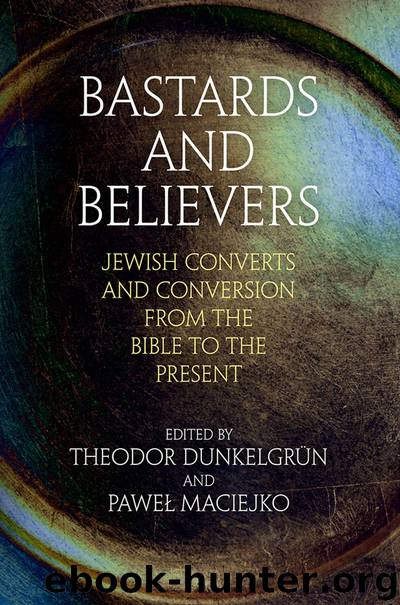Bastards and Believers by Theodor Dunkelgrun & Paweł Maciejko

Author:Theodor Dunkelgrun & Paweł Maciejko [Dunkelgrün, Theodor & Maciejko, Paweł]
Language: eng
Format: epub
ISBN: 9780812296754
Publisher: University of Pennsylvania Press, Inc.
Published: 2020-06-15T00:00:00+00:00
The Conversion Plot in the Twenty-First Century
The modern Anglo-Jewish writer Howard Jacobson might be said to have inherited Zangwill’s ambivalent “bequests.” With its swearing and sex, its references to Gaza and Obama, no one would confuse Jacobson’s Booker Prize–winning Finkler Question with a Victorian novel. Yet Jacobson describes himself as the “Jewish Jane Austen,” indebted to George Eliot and Dickens.70 In this essay’s final section, I propose that we might also look to another form of nineteenth-century novel as a precursor to and influence on The Finkler Question. For neither the trappings of twenty-first-century life nor what some reviewers have seen as the novel’s relative plotlessness should obscure the nineteenth-century conversion narrative at its heart.71
Jacobson both echoes and wryly inverts this narrative. The most salient reversal is the direction of conversion, which moves—or tries to—from Englishness to Jewishness. Here, even more than in Zangwill, the process of conversion involves shifts between Jewishness and Englishness rather than Christianity; Anglicanism is taken for granted as Englishness’s default setting yet is largely irrelevant. The novel follows Julian Treslove, a wandering Englishman of sorts, who yearns to become Jewish, even if he cannot quite define what that means. The title captures the novel’s revisionism: Finkler is the last name of Sam Finkler, Julian’s first Jewish friend, his introduction to the mysterious appeal of Jewishness; from childhood on, Julian mentally substitutes “Finkler” for “Jew.” In other words, this is a novel about “the Jewish Question” cheekily reformulated for contemporary culture, a novel whose central question (a recurring one in Jacobson’s work) is just what it means to be an English Jew. Extending Victorian novels’ focus on interiority, most of The Finkler Question consists of Julian’s inner ruminations on this question, presented through free indirect discourse. As the narrative slips in and out of Julianisms, it is not always clear when we are meant to agree with a sentiment or stereotype, which is, as we will see, largely Jacobson’s point. Like the characters, readers are forced to evaluate whether there is such a thing as “thinking Jewishly” and whether that form of thinking can be learned by reading the novel itself.72
The Finkler Question, like its nineteenth-century conversion precursors, approaches such questions in part by testing whether one can stop being Jewish, since Sam Finkler abandons his Judaism and sometimes his Jewishness as he embraces Englishness. But the novel also tests whether one can start being Jewish. The old questions asked about Jews who turn Protestant or English are reversed: Must one inherit Jewishness, or can one convert to it, and, if so, how? Are official sources of authority necessary, or can Jewishness be acquired through Jewish foods, books, or “habits of mind”? As Julian’s son asks, “You can’t just get up one morning and decide you’re a Jew—or can you?” (106). Reading The Finkler Question through the lens of the conversion plot sheds light on the novel’s answers to these questions, or rather the elusiveness of such answers. It also helps us understand the way stories
Download
This site does not store any files on its server. We only index and link to content provided by other sites. Please contact the content providers to delete copyright contents if any and email us, we'll remove relevant links or contents immediately.
The 5 Love Languages: The Secret to Love That Lasts by Gary Chapman(9782)
The Space Between by Michelle L. Teichman(6927)
Assassin’s Fate by Robin Hobb(6197)
Wiseguy by Nicholas Pileggi(5767)
Everything Happens for a Reason by Kate Bowler(4729)
Gerald's Game by Stephen King(4640)
Pillow Thoughts by Courtney Peppernell(4271)
A Simplified Life by Emily Ley(4156)
The Power of Positive Thinking by Norman Vincent Peale(4055)
Harry Potter and the Prisoner of Azkaban (Book 3) by J. K. Rowling(3346)
Resisting Happiness by Matthew Kelly(3337)
Girl, Wash Your Face by Rachel Hollis(3277)
Being Aware of Being Aware by Rupert Spira(3272)
The Code Book by Simon Singh(3176)
The Secret Power of Speaking God's Word by Joyce Meyer(3169)
More Language of Letting Go: 366 New Daily Meditations by Melody Beattie(3017)
Real Sex by Lauren F. Winner(3013)
Name Book, The: Over 10,000 Names--Their Meanings, Origins, and Spiritual Significance by Astoria Dorothy(2978)
The Holy Spirit by Billy Graham(2942)
